An Authentic Hill Tribe Experience
All written content ©2008, Laurie Weed. All images ©2008, Laurie Weed.
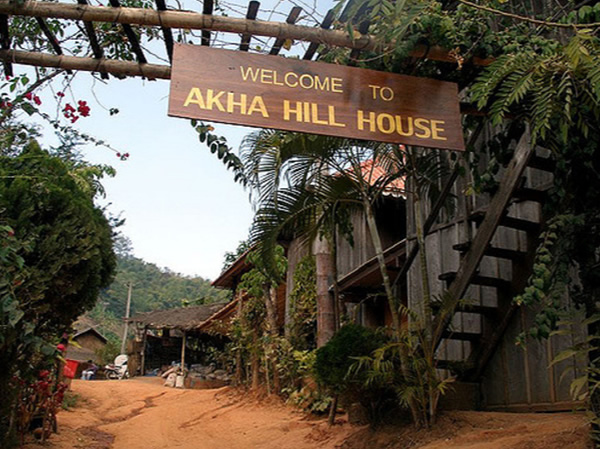
|
|
Welcome sign at the Akha Hill House.© 2008, Laurie Weed.
|
Waking up with coffee and eggs on the bamboo veranda, my fellow travelers and I are taking in the valley view — a palette of greens dotted here and there with thatched roofs and spirals of wood smoke. Far from the increasing bustle of Chiang Rai city, our peaceful perch on the hillside is an oasis not only for us, but also for the Akha people who live here full-time. Though you’d never know it here at Akha Hill House, Northern Thailand’s trekking industry is booming, with hundreds of tour companies competing to drag the crowds through a well-trampled circuit of impoverished minority villages. The agents collect hefty fees for delivering this “authentic hill-tribe experience" — complete with bamboo rafts and elephants — while the villagers eke out a few baht selling handicrafts and sodas to tourists, or posing for photographs in colorful native costumes. By contrast, Akha Hill House is the only tribal-owned retreat and trekking operation in Chiang Rai province, offering an opportunity to learn about real Akha culture, past and present, and to feel less like a gawping tourist than a welcome guest.
As I learned on my first trip to these mountains five years ago, a few days can easily lapse into a week or more as the self-imposed limitations of time quickly give way to the natural restrictions of temperature, and to a schedule more in tune with the rhythms of nature. In the cool morning hours, hikes through the quiet forest might include a visit to neighboring Lahu, Yao, Karen, or Lihu villages, where the locals are becoming more accustomed to seeing foreign visitors and may even approach you for a chat. Their entrepreneurial Akha neighbors are so well known by now that if you get lost, you can ask anyone in this valley to point you back toward Akha House. In the sultry afternoons, follow the locals’ example and stroll down to the waterfall for a picnic and a swim.
For longer treks, you can hire a local guide to lead you further up into the hills, teach you about medicinal plants and traditional Akha hunting techniques, and then help you whip up lunch in a simple bamboo steamer, cut down and fashioned on the spot. For the more adventurous types, your Akha guide can help you build a banana-leaf shelter to spend a night or two in the open jungle, listening to the monkeys (and hopefully, nothing bigger) shriek and chatter.
With only 27 families in the Akha village, you’ll quickly make new friends. One afternoon, with eight-year-old Chulay as my interpreter (and assistant photographer), I spent a couple of hours chatting with some of the older women of the tribe and watching them make crafts to sell. The evenings slip away around the bonfire, where everyone, visitors and locals alike, gathers after dinner to catch up and trade gossip. The Akha women often bring their sewing along, and schoolchildren may wheedle you into playing a homemade board game similar to checkers. Guests returning from a trek or day hike often have exciting discoveries to share; while Chief Apae is happy to discuss Akha history and culture (just don’t get him started on local politics!) While I can’t personally vouch for the aforementioned banana-leaf shelters, you’ll sleep soundly in a rustic bamboo bungalow or one of the lovely new cabins, built with environmentally-friendly adobe and stucco.
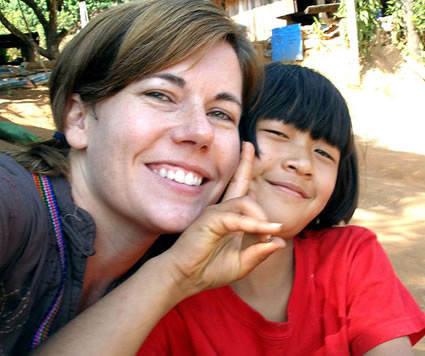
|
|
Chulay, my village guide. © 2008, Laurie Weed.
|
As idyllic as the village looks today, the tribe struggled to get here. After migrating from Tibet through Myanmar, they settled on this hillside almost 20 years ago. Like all refugees, they were ineligible for Thai citizenship for many years. Counted among Thailand’s poorest minority groups, there are some 80,000 Akha people scattered around the country. Without nationality, access to jobs, services, or protection, many of these “mountain people” live in primitive conditions and fend for themselves however they can, often turning to slash-and-burn agriculture and opium trade. But this refugee village of less than 100 people, led by a very determined young chief, developed a different vision for survival in a changing world. Practicing their traditional form of democracy, together they decided that education would be the key to preserving their precious heritage and providing their children with more choices in the future. At that time, the nearest secondary school was two hours away in Chiang Rai and operated on a private system.
Like most hill tribes, the Akha were subsistence farmers with almost no cash income. Observing the thundering hordes of day-tripping tourists that Thai agents brought to a Karen village upriver, Chief Apae figured he could operate a tour business just as well if not better. Under his direction, the tribe built a modest bamboo guesthouse and a lean-to that still serves as their restaurant. They learned to purify water, bought a small generator, and Akha Hill House was open for business. All of the early profits, such as they were, went to an educational fund for the children. With the help and enthusiasm of visitors, the non-profit Student Project was born; complete with secured bank account, website, and donor t-shirts. At that time, the tribe owned only one vehicle, so Chief Apae made the trip to Chiang Rai almost daily to chauffeur the kids to school. As word spread of this unique enterprise, private donations and sponsorships began to supplement the modest guesthouse earnings.
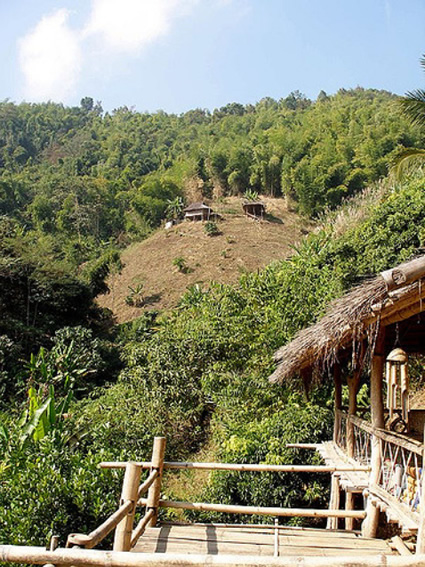
|
|
View from Restaurant, Akha Hill House. © 2008, Laurie Weed.
|
In spite of occasional threats and sabotage from competing tour operators, Akha Hill House survived and as a direct result, all of the tribe’s children went to school. Today, Akha children attend grades 1-12 at the new village school, within walking distance from their homes. Although the new school is government-supported, Akha Hill House still donates 10 percent of its earnings to a trust fund, ensuring that every child has books, uniforms, school supplies, and the opportunity to learn what their parents and grandparents could not.
On an average day at Akha House, you won’t find too many villagers decked out in ceremonial clothing. They don’t keep elephants or river rafts. They’re just living their lives, and adapting as well as they can to a changing world. If you ask them — as I did — many will say they’re happy to have a home in the hills, where they feel they belong, as well as a better future for their children, and the chance meet and talk with people from all over the world. It is, without question, an authentic hill tribe experience.
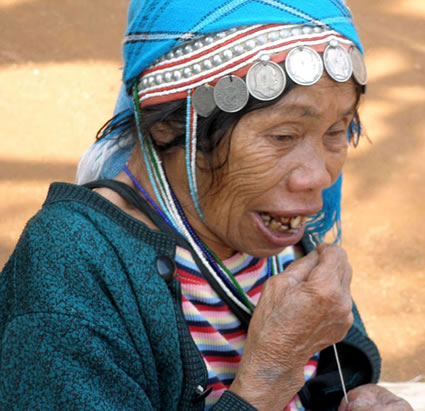
|
|
Akha Grandmother. © 2008, Laurie Weed.
|
|
For More Info
Akha Hill House is a tour and trekking operation in the Chiang Rai province owned by a local hill tribe. Ten percent of the guesthouse income (along with 100 percent of the income from the special “project bungalow”) is donated to the Akha village school fund. In 2006, Chief Apae Amor, who never attended school himself, was named the TAT Tour Guide of the Year, a prestigious national award for professional guides who give back to their communities. He is the first Akha ever to receive this honor.
Akha Hill House
Akha Hill House is located in a small mountain village 23 km (about 1-1/2 hours’ drive) from Chiang Rai city. The mountain setting is lovely year-round, although dry season is the easiest time to get there as parts of the road are steep and unpaved. Call for free 4WD transportation to/from anywhere in Chiang Rai city. Akha Hill House can also be reached via the Mae Kok river, although this is less straightforward. Boats from Chiang Rai (inquire at the main pier) or Tha Ton will make an extra stop at the national park’s hot springs by prior arrangement. From there, a 2+ hour hike through the hills (very scenic, but muddy and challenging in wet season) will bring you to Akha Hill House.
Unique Volunteer Opportunity
Volunteer English teachers are needed at the local village school (grades 1-12). Akha Hill House will provide volunteers with guesthouse accommodation and meals. Teaching experience is helpful but not required. A minimum two-week commitment is requested.
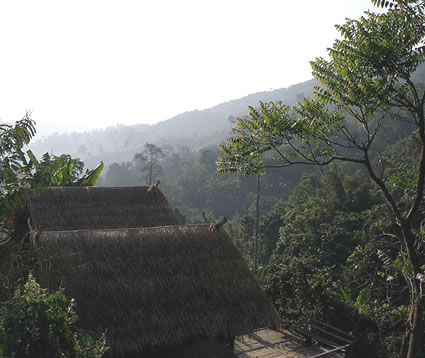
|
|
Morning Mist, Akha Hill House.
© 2008, Laurie Weed.
|
|
Laurie Weed is a freelance writer and editor. Her work has appeared in various Travelers’ Tales' anthologies, To Asia with Love books, and webzines/websites throughout for the past decade.
|
